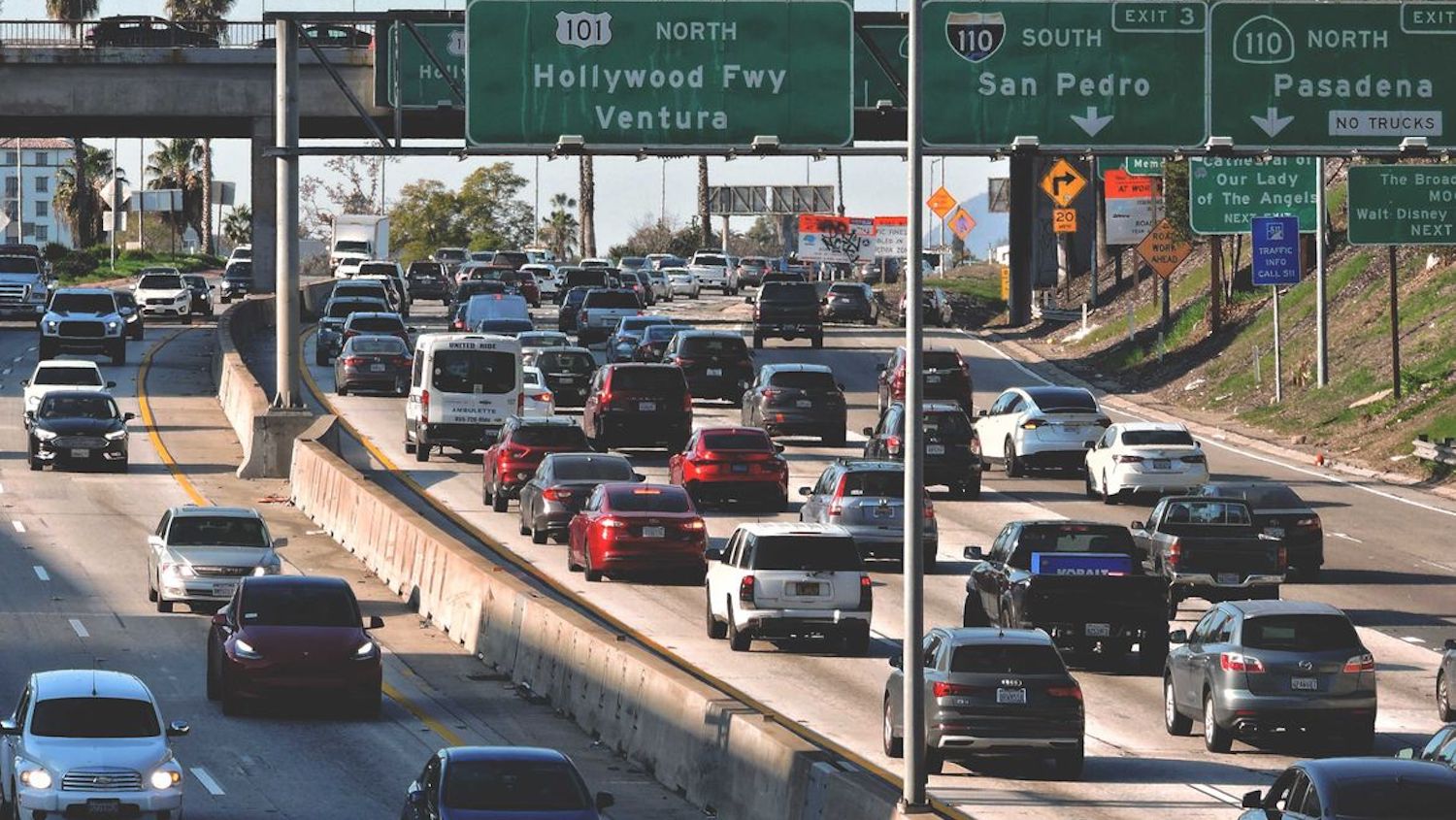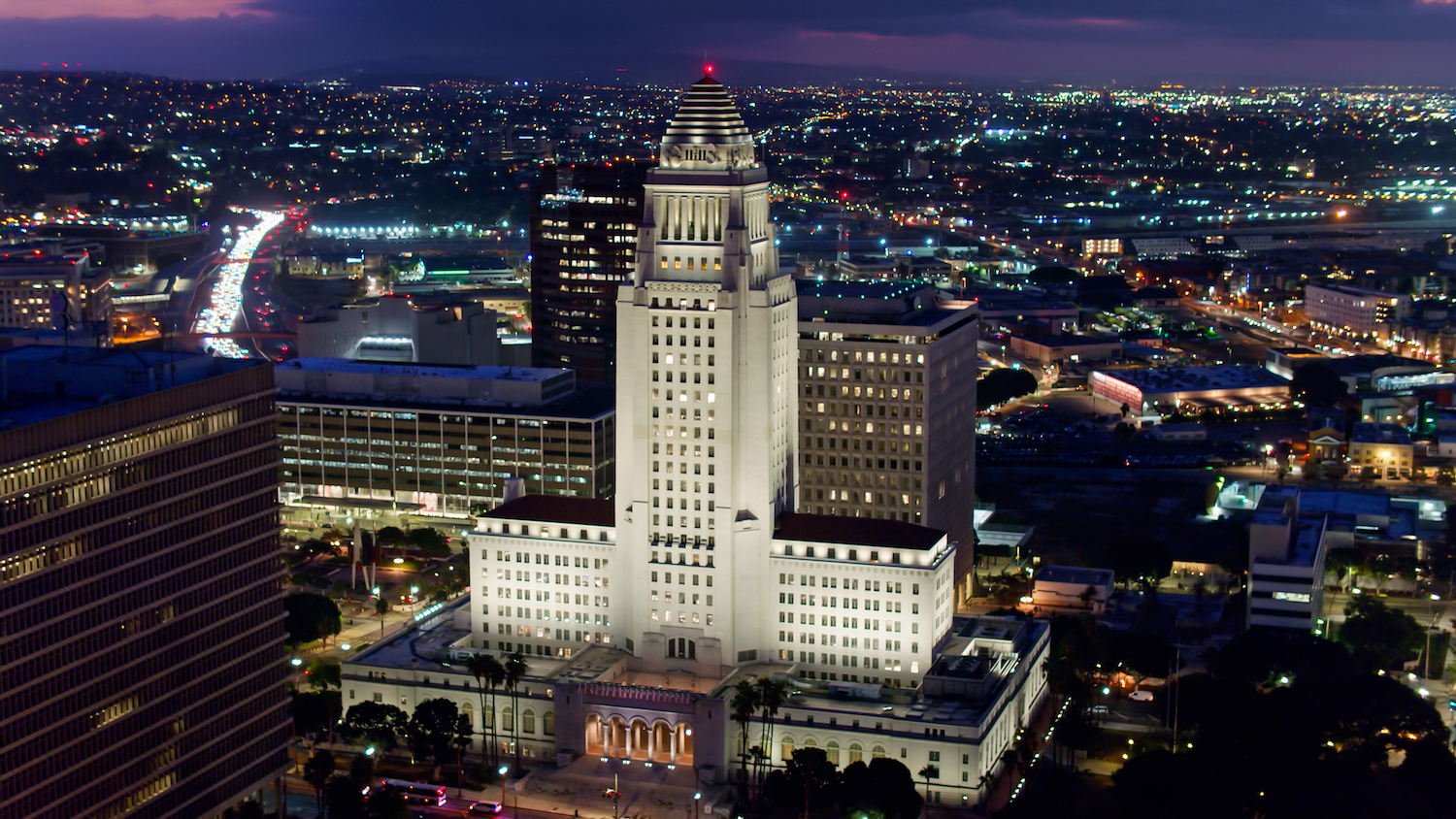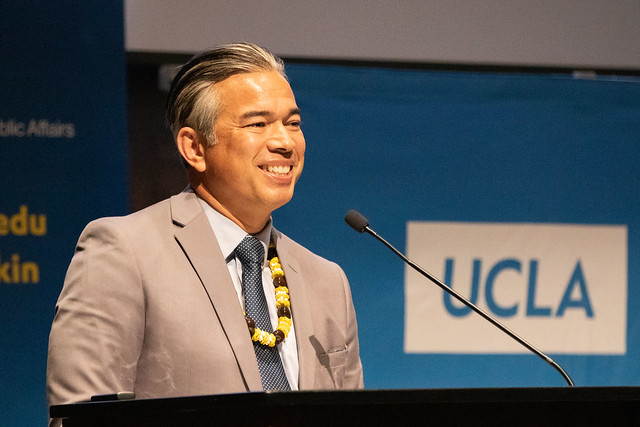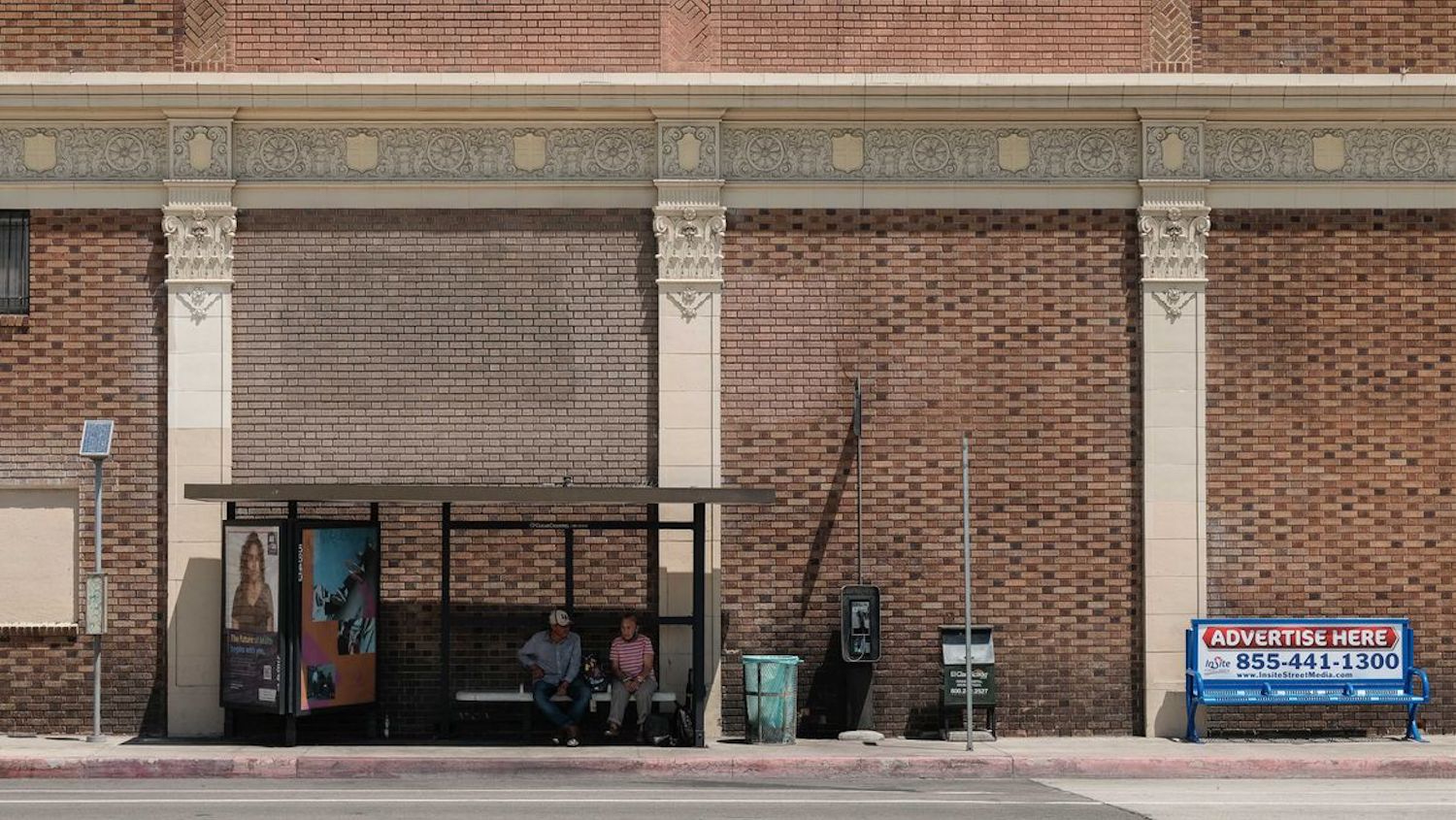Sustainable LA Grand Challenge Launches Initiative Focused on Transportation
The UCLA Sustainable LA Grand Challenge has launched an initiative called TRACtion — for Transformative Research and Collaboration — that will bring UCLA scholars together with community stakeholders to address key topics related to sustainability: transportation, energy, water and ecosystems. The program will begin with a two-year series of activities and funding opportunities that will tackle the region’s seemingly intractable transportation challenges. Called Transforming Transportation in Los Angeles, this track will tap the expertise of the UCLA Institute of Transportation Studies (ITS), which will work with community-based organizations and advocacy groups to identify barriers to a more equitable transportation system, then fund research to fill some of these gaps. TRACtion organizers held a Jan. 26 kickoff meeting that included California Transportation Secretary Toks Omishakin, UCLA faculty from several disciplines, and community organizations engaged with transportation and environmental justice. “These are voices that will disagree and push each other,” said Adam Millard-Ball, professor of urban planning and acting director of ITS. “If we don’t make some people uncomfortable, I don’t think we’ve pushed people far enough.” He said it is critical that the effort encompass expertise from across numerous disciplines. Involving political scientists, for example, might illuminate how elected officials determine transportation policy; historians could help explain how the car has come to dominate transportation discourse; artists and designers could help ensure that solutions are shared with the public in engaging and culturally relevant ways. “Transportation equity and sustainability are too important to be left to transportation scholars alone, and we need these sophisticated, multidisciplinary perspectives,” he said.
Segura to Co-Chair Project for Better L.A. Governance
UCLA Luskin Professor Gary Segura has been named co-chair of a coalition of Los Angeles-based scholars and researchers who will develop proposals for bringing better governance to L.A.’s halls of power. The L.A. Governance Reform Project was launched amid recent controversies at Los Angeles City Hall that have underscored the need for a transparent, accountable and community-driven system of government in the diverse and dynamic region. The group’s first task will be to produce recommendations for an independent redistricting process to be presented to policymakers in the coming months. The team will then turn to other areas, including but not limited to City Council expansion, ethics and land use reform. As they conduct their analysis, the scholars will consult with several members of the governmental, civic, activist and academic communities. “This is an all-hands-on-deck moment in Los Angeles. Interest in reform is high throughout the community, and the best reforms will generate the widest and broadest community support,” said Segura, whose academic work focuses on political representation and social cleavages. Segura serves as co-chair with Professor Ange-Marie Hancock of the University of Southern California, and the project will be administered by the Pat Brown Institute for Public Affairs at Cal State Los Angeles. The L.A. Governance Reform Project team also includes scholars from Cal State Northridge, Loyola Marymount University and Pomona College. The project has received funding from philanthropic organizations including the California Community Foundation, The Eli and Edythe Broad Foundation and the Weingart Foundation.
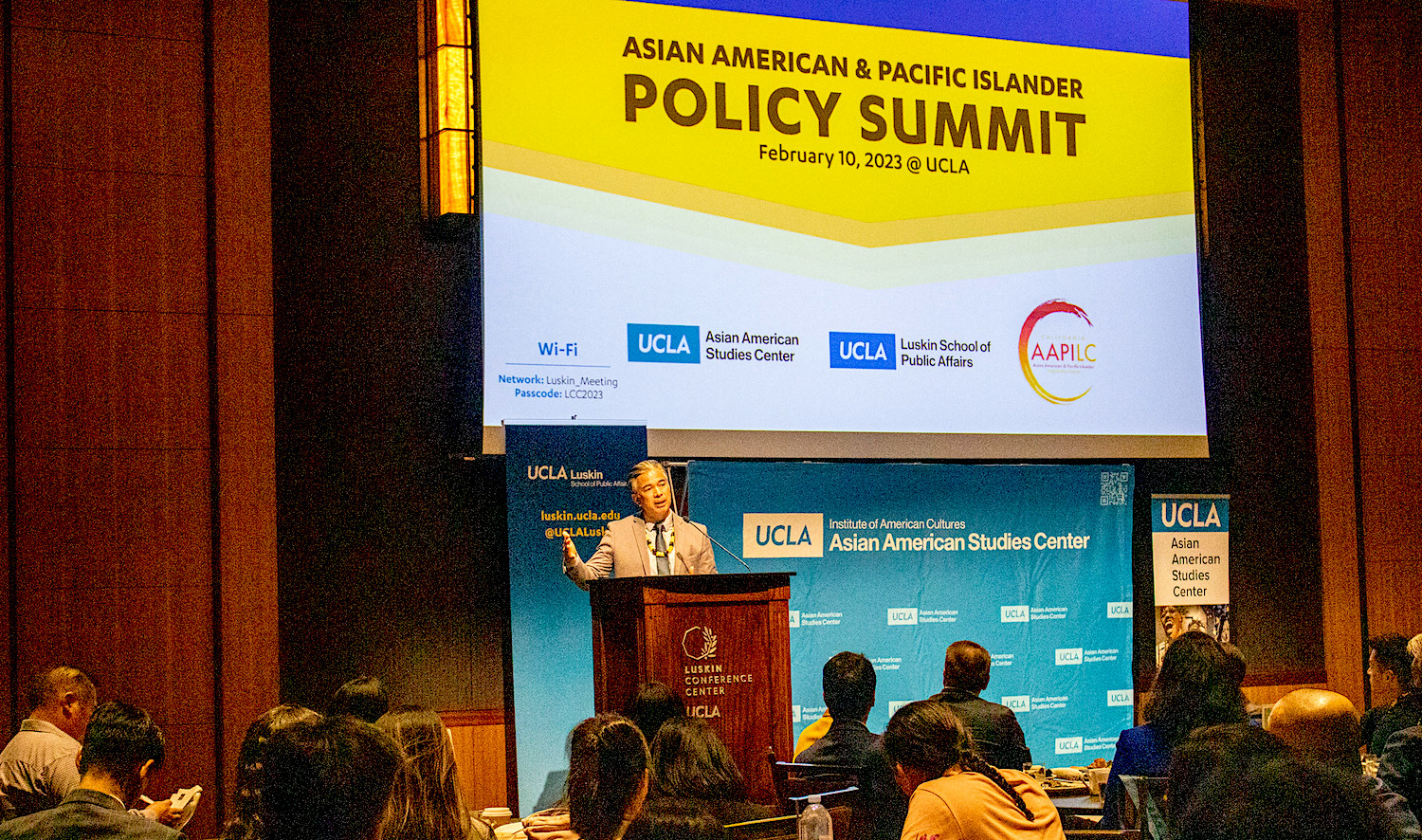
AAPI Summit Draws Leaders in Search of Policy Solutions
UCLA scholars and students gathered with leaders from the government, community, corporate and entertainment worlds at a Feb. 10 summit aimed at creating a future that is inclusive of Asian American, Native Hawaiian and Pacific Islander communities. The AAPI Policy Summit at UCLA’s Luskin Conference Center shed light on issues including health and mental health inequities, anti-Asian hate, immigrant protections, mobilization of voters, diversity in corporate suites and fair representation in Hollywood. California Attorney General Rob Bonta delivered the keynote address at the daylong summit. “You can’t fix the problem until you face the problem,” he said. “I believe that the folks on the ground who are doing the work —community leaders, researchers, nonprofit leaders — that the folks who are closest to the problems and the challenges are also the closest to the solutions.” Touching on his experiences growing up in a family of Filipino immigrants who fought for civil rights, Bonta urged members of the audience to recognize their own capacity to stand up against injustice. “We are not bystanders to what is happening in our state and in our nation. … We can make a difference,” he said. “The road is long but we are bending that arc of history towards justice, and it’s going to need the fingerprints and the hands of all of you bending it together to get us where we need to go.” The AAPI Policy Summit was sponsored by UCLA’s Asian American Studies Center and Luskin School of Public Affairs in partnership with the California Asian American & Pacific Islander Legislative Caucus.
View photos from the summit on Flickr.
UCLA Study Finds Only a Quarter of L.A. Metro Bus Stops Offer Shade
According to a new UCLA report, only 26% of Los Angeles Metro bus stops have shelters that provide shade. The figure is significant because some of the L.A. residents who are most likely to get around the city on foot or using public transportation will be among the populations who, in the coming years, will have the highest risks for death from heat-related causes. And research has demonstrated that bus shelters are a proven way to help mitigate the impact of extreme heat. In the U.S. overall, extreme heat already kills more people than any other natural disaster. And a 2020 study by the Los Angeles Urban Cooling Collaborative found that as Los Angeles gets hotter, Black, Latino and older adults will experience the largest increases in mortality due to increases in extreme heat. So researchers led by Madeline Brozen, deputy director of the UCLA Lewis Center for Regional Policy Studies, worked in collaboration with the advocacy group MoveLA to create a baseline understanding of how prevalent shelters are for Los Angeles bus riders, especially with legislation on the topic now being considered in the California State Assembly. More than 60 transit agencies provide service to the region, but Metro is the largest and was the focus of the new study. Researchers analyzed where in Los Angeles shelters are located, measured their locations against average summer temperatures, and compared the numbers of shelters across cities and legislative districts. Interactive maps allow residents to click on an individual city to see statistics for that jurisdiction. — Claudia Bustamante
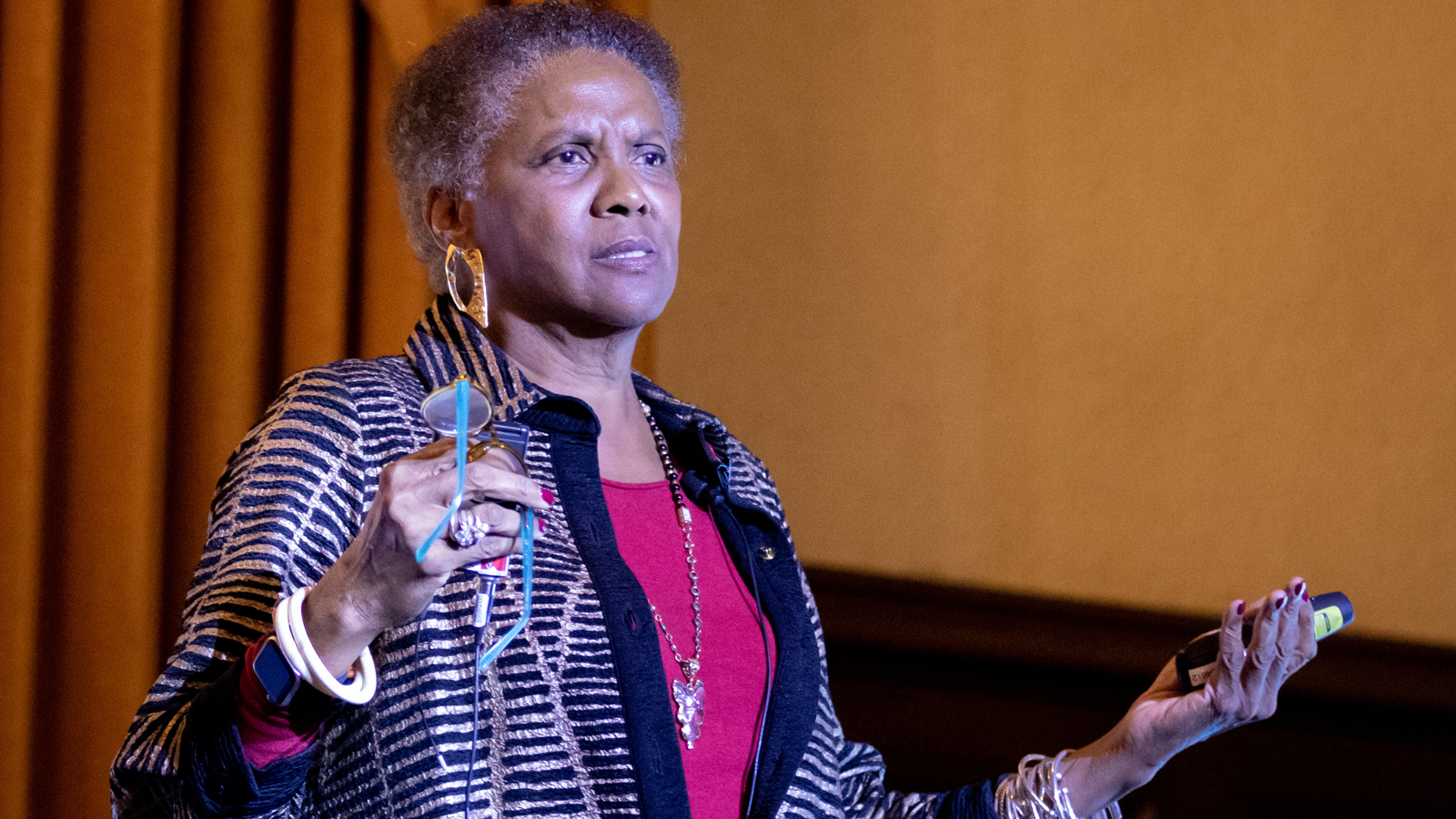
Climate Expert Puts the Blame on Consumer Culture in Regents’ Lecture
Efforts to move to green technology and sustainable policies don’t stand a chance against climate change as long as one key element continues to be ignored: “We are overproducing and we are overconsuming,” said author and climate justice expert Denise Fairchild during a Feb. 2 Regents’ Lecture. “Look at the shirt that you have on,” Fairchild told the audience of about 50 faculty, staff, students and other interested parties who had gathered in the Grand Salon of UCLA’s Kerckhoff Hall. “Now think about measuring all the emissions that went into producing those things from the point of extraction. … Think of all the work that took place someplace else, and then how it was shipped to where you live,” said Fairchild, who earned her doctorate in urban planning from UCLA in 1987. “What are the emissions along that supply chain?” In her presentation, the president emeritus of the nonprofit Emerald Cities Collaborative talked about her Climate Breakthrough project, for which she received a $3 million award aimed at advancing transformative solutions to the climate crisis. In her view, it won’t be possible to solve the climate crisis without changing our culture. “We are a culture of individuals. … We don’t have a collective spirit, a spirit of communitarianism. And as a result, our ability to adapt to climate change is going to be compromised,” she said. “We have to figure out how we redesign our lifestyles to create new measures of joy and well-being. How do we reduce carbon? By changing our consumption patterns.”
Read a transcript of the lecture, listen to the audio recording or view photos on Flickr.
Exploring Impact of COVID-19 on Urban Mobility
In her introduction to a new book, Anastasia Loukaitou-Sideris writes, “The COVID-19 pandemic brought urban life all over the world to a standstill, it dramatically affected mobility and had ripple effects on the economy, environment and safety of urban areas. But not all residents were affected equally.” Loukaitou-Sideris, distinguished professor of urban planning and interim dean of the Luskin School, served as co-editor of “Pandemic in the Metropolis: Transportation Impacts and Recovery.” Published by Springer Nature, the book is a collection of original research articles by authors from UCLA and other University of California Institute of Transportation Studies programs. It explores various impacts of the pandemic on vulnerable populations, on the transportation industry and on other sections of the economy that rely on transportation. It also looks at the health crisis’ ongoing impacts on alternative forms of work, shopping and travel. Positive changes in urban transport, telecommuting, e-retail, walking and cycling are also explored, and authors discuss whether these altered patterns are likely to persist. The collection is dedicated to the late Martin Wachs, a leading scholar in the field of transportation planning.
Telehealth, Key Part of Pandemic-Era Care, Should Be More Accessible, Study Finds
A study by the UCLA Latino Policy and Politics Institute found that since COVID-19 emerged, language barriers have prevented Latino and Asian patients in Los Angeles from making full use of telehealth services. The research also revealed that Black and white patients had greater ease with video visits — and that some older patients and those with limited access to technology, particularly Latinos, relied on family members to help them access telehealth services. The study is based on data from a Los Angeles County health care system: Researchers analyzed patient visits from January through December 2020 and conducted surveys and interviews with 39 health care providers at seven of the health system’s clinics between August 2021 and April 2022. The findings underscore the need for care providers to take into account the roles that patients’ race, ethnicity, age and primary language play in how telehealth services are adopted. This study is timely because in July 2022, the U.S. House of Representatives approved a bill to extend Medicare reimbursements for telehealth visits through the end of 2024, and the U.S. Senate is currently considering legislation that would direct more funding for telehealth visits to Medicare beneficiaries. The study’s authors recommend that health care systems and providers address the digital literacy and technology barriers that patients face by investing in programs that provide technology support, both in person and remotely, to people who have trouble navigating telehealth on their own. Further, they urge providers to support efforts to allocate technology devices and internet services to their patients.
